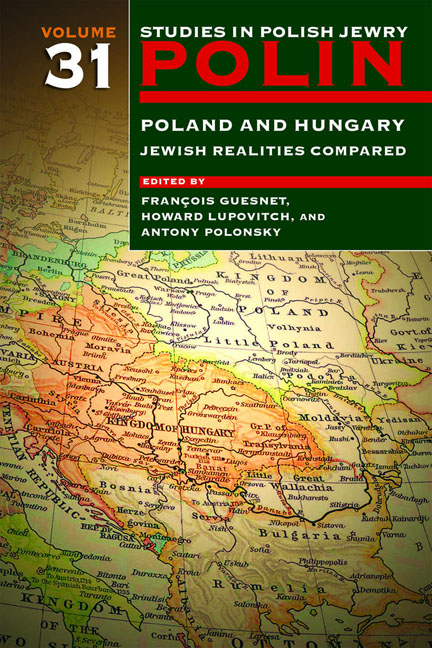Book contents
- Frontmatter
- Dedication
- Editors and Advisers
- Preface
- Polin
- Polin: Studies in Polish Jewry
- Contents
- Note on Place Names
- Note on Transliteration
- Part I POLAND AND HUNGARY: JEWISH REALITIES COMPARED
- JEWISH ACCULTURATION AND INTEGRATION
- JEWISH RELIGIOUS LIFE
- JEWS IN POPULAR CULTURE
- THE INTERWAR YEARS
- THE HOLOCAUST AND ITS AFTERMATH
- PERSONAL REFLECTIONS
- Part II NEW VIEWS
- Part III OBITUARIES
- Notes on the Contributors
- Index
Polish National Antisemitism
- Frontmatter
- Dedication
- Editors and Advisers
- Preface
- Polin
- Polin: Studies in Polish Jewry
- Contents
- Note on Place Names
- Note on Transliteration
- Part I POLAND AND HUNGARY: JEWISH REALITIES COMPARED
- JEWISH ACCULTURATION AND INTEGRATION
- JEWISH RELIGIOUS LIFE
- JEWS IN POPULAR CULTURE
- THE INTERWAR YEARS
- THE HOLOCAUST AND ITS AFTERMATH
- PERSONAL REFLECTIONS
- Part II NEW VIEWS
- Part III OBITUARIES
- Notes on the Contributors
- Index
Summary
IN 2016 I published the results of three surveys, two on antisemitism and xenophobia in Poland and one on antisemitism and xenophobia in Ukraine, in Polin 29. The first of these was conducted in 1992, at the very start of Poland's turn to democracy. The second, conducted ten years later in 2002, coincided with the end of the transition to democracy and just before Poland's acceptance into the European Union. Shortly afterwards, in 2003, thanks to a grant from the Polish Committee of Scientific Research, we conducted a comparative study in Ukraine.
I now present the conclusions of a fourth survey, conducted in Poland a decade later in 2012 and representing a time when democracy was supposedly being consolidated. This survey reveals some optimistic changes in Poles’ behaviour and attitudes towards Jews and ‘Others’ in general. It shows, however, some very disturbing features. These would be felt some years later when the right-wing, nationalist-Catholic Law and Justice Party (Prawo i Sprawiedliwość; PiS) won the presidential and parliamentary elections in 2015. This new material adds to the picture that emerged from the previous surveys, but other features are evident as well. We were unable to repeat the survey in Ukraine because of the outbreak of social protest and the occupation of Maidan in Kiev in 2013.
In this chapter I present the key arguments and conclusions on antisemitism in Poland, as well as on ‘Polish antisemitism’ (in the context, of course, of a more general discussion on xenophobia and national stereotypes). My views were outlined in the earlier article, but I now expand and justify them. This chapter essentially falls into two parts: in the first part I show the changes that have taken place in Polish attitudes to Jews; in the second, I discuss new developments and theories as well as providing justifications for them.
The field work of the 2012 survey, as previously, was carried out by the Social Research Workshop in Sopot. This ensured that the sample was as similar as possible to those of the earlier studies, although it was slightly larger: 1,201, compared with 1,011 in 1992 and 1,098 in 2002.
- Type
- Chapter
- Information
- Polin: Studies in Polish Jewry Volume 31Poland and Hungary: Jewish Realities Compared, pp. 515 - 542Publisher: Liverpool University PressPrint publication year: 2018



